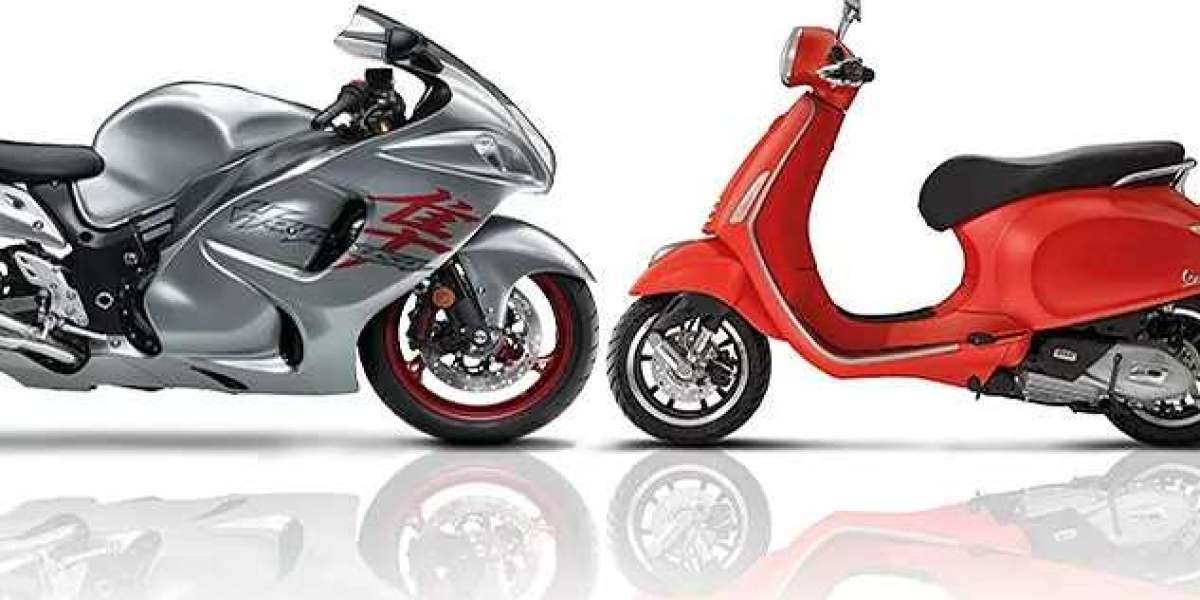Introduction
In today's world, it is essential to consider various aspects before purchasing any type of vehicle. When it comes to two-wheelers, people are often confused between buying a motorcycle or a scooter, but which option is the best? We will explore that in this blog!
Motorcycle v/s Scooter - Who Takes The Win?
Motorcycle:
Choosing between a motorcycle and a scooter can be an exciting experience in itself. Motorcycles are the pinnacle of speed and strength for those who love the sound of an engine and the exhilaration of being on the open road. Due to their powerful engines and stylish designs, motorcycles are meant for both high-speed commuting and long-distance riding. Weekend warriors and fans of long road trips turn to two-wheelers as they provide unmatched freedom and thrill on every excursion.
Scooters:
But scooters have a distinct appeal all their own. Known for their excellent fuel efficiency and agile handling, they are the secret heroes of urban transportation. Scooters are lightweight, adaptable, and ideal for navigating congested areas and cramming into small parking spaces. They are the best for short journeys around town and everyday tasks because of their excellent gas mileage, utility, and ease. Choosing the ideal two-wheeled partner for your way of life can be facilitated by knowing the fundamental differences between these two types of rides, regardless of whether you're a thrill-seeker or a prudent commuter.
Understanding Motorcycles
Performance and Power
Motorcycles are renowned for their efficiency and power, making them an excellent choice for people seeking speed and excitement. Compared to scooters, these vehicles have larger engines, often with capacities from 125cc to over 2000cc. Motorcycles with this engine capacity can accelerate quickly and travel at high speeds, making them suitable for commuting and cruising. People who enjoy the excitement of rapid velocity and the capacity to travel great distances quickly frequently discover motorbikes as their ideal vehicle choice.
Variety of Models
One of the most significant advantages of motorbikes is the wide range of models offered, appealing to various preferences and demands. There are many alternatives, from cruisers and sports motorcycles to touring bikes and dirt bikes. Sport bikes have aerodynamic shapes and potent engines built for speed and agility. Racing enthusiasts and others who like fast drives on highways are big fans of such bikes.
In contrast, cruisers provide a more laid-back riding experience. They're distinguished by their low seat height, good ergonomics, and classic appearance. Cruisers are ideal for long, leisurely journeys and are frequently chosen by folks who prefer riding their bikes more comfortably.
Riding Experience
A motorcycle ride is unlike any other, providing a sense of freedom and connection to the road that is difficult to replicate. Motorcyclists can experience traveling in nature, inhaling fresh air, and viewing the world unhindered. Many riders find this immersive experience appealing since it instills a sense of adventure.
In addition, motorcycles are more maneuverable than cars and other larger vehicles. Their relatively small size makes them perfect for city commuting, making it easy for riders to navigate through traffic. Motorcycles' agility makes for a better riding experience overall by providing riders with a higher sense of command and responsiveness.
Motorcycle Insurance Considerations
There are several factors to consider when buying insurance for motorcycles. Understanding these elements will help you obtain the appropriate coverage and reduce your insurance premiums.
- Engine size:
The motorcycle's engine size significantly influences motorcycle insurance premiums. Larger engines are linked to faster speeds and greater hazards, which increases the price of insurance. A 1000cc sport bike, for instance, will often cost more to insure than a 250cc commuter bike. When selecting a motorcycle, engine size is an essential factor to consider because it directly impacts performance and insurance costs.
- Rider's age and experience:
Insurance providers also take the rider's experience level and age into account. Younger riders, particularly those under 25, frequently have higher comprehensive motorcycle insurance costs because of their inexperience and increased risk of collisions. On the other hand, motorcyclists with more experience and age may qualify for reduced rates. Since completing a motorcycle safety course shows that you are committed to safe riding, it may also lead to lower insurance premiums.
- Type of motorcycle:
Your insurance prices will be influenced by the kind of motorcycle you select. Compared to cruisers or touring motorcycles, sports bikes are usually costly to insure due to their increased speed and capability. This results from the increased risk of riding sports bikes, which are more prone to collisions. However, touring bikes—meant for extended journeys and comfort—may be less expensive to insure because of their steady and secure riding qualities.
- Usage:
Another important consideration when calculating insurance prices is how you want to use your motorcycle. If you use your bike primarily for commuting or everyday transportation, your premiums may be higher than for occasional leisure use.
Understanding Scooters
Convenience and Efficiency
Scooters are an excellent option for people seeking a valuable form of transportation or commuting in cities. They are very efficient and easy to use. Scooters are engineered with smaller engines than motorcycles, usually between 50 and 250cc, which helps them be more fuel efficient. In addition to saving time and money, riders can enjoy longer journeys without having to stop frequently at gas stations.
User-Friendly Design
Scooters are known for their unique design, making them suitable for various riders, including those with little experience. Scooters often have automated gearboxes, which eliminate the need for manual gear shifting. Compared to motorcycles, which frequently require manual clutch and gear operation, scooters are far easier to use. Riders can concentrate more on the road than driving mechanics, making the ride hassle-free and secure.
Storage and Practicality
Scooters are made with the needs of everyday travelers in mind, providing a variety of storage options. Most scooters offer sizable under-seat storage spaces to hold a helmet, groceries, or other belongings. This built-in storage is convenient for riders who need to carry necessities but want to avoid carrying around extra luggage or a backpack.
Scooter Insurance Considerations
Various factors affect the cost and type of coverage necessary when insuring a scooter. By being aware of these variables, you can compare insurance options better.
- Engine size:
An important factor in determining insurance costs for scooters is the engine size. Scooters' smaller engines usually translate into cheaper insurance premiums. For example, the insurance cost for a 50cc or 125cc scooter is typically less than that of a larger motorbike. Because smaller engines have lower top speeds and are less likely to be part of high-speed accidents, insurance firms consider them less dangerous. Considering the engine size when choosing a scooter can help you save money on insurance.
- Rider’s age and experience:
The age and experience of the rider are important considerations when setting insurance rates. Due to their assumed increased risk, younger riders—especially those under 25—typically pay higher insurance premiums. On the other hand, scooters may have slightly cheaper rates for young riders than motorbikes because they are safer and more accessible for beginners than any other vehicle. Insurance costs might be lowered for seasoned riders with clean records.
- Type of use:
How you plan on using your scooter will also affect the insurance cost. Scooters used for recreation or enjoyment have different insurance requirements than those used mainly for urban commuting. Regular commuters may require more comprehensive coverage because of the higher danger of accidents in densely populated urban areas. However, if you just use the scooter for short trips on certain occasions, you might be interested in a less comprehensive policy.
- Location:
The location where you ride and store your scooter greatly impacts insurance prices. Insurance premiums can be more significant in urban locations than in rural or suburban areas due to higher traffic density and theft rates. In addition, you can get insurance discounts if you keep your scooter in a locked garage or elsewhere with limited access. When getting insurance for your scooter, it's critical to consider the traffic patterns, crime rates, and other external factors that insurers use in assessing risk.
Conclusion
Ultimately, deciding between a scooter and a motorbike boils down to what best suits your needs. If you enjoy speed and extended road journeys, a motorcycle's power and variety might be ideal for you. However, a scooter is perfect if you're looking for something useful, simple to use, and perfect for city commutes. Just like you compare insurance policies from various providers, compare your vehicle's features before purchase and make the right decision!








